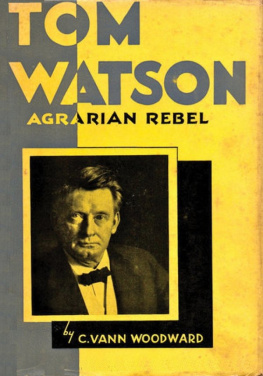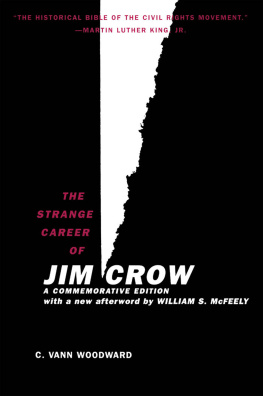C. Vann Woodward - Tom Watson: Agrarian Rebel
Here you can read online C. Vann Woodward - Tom Watson: Agrarian Rebel full text of the book (entire story) in english for free. Download pdf and epub, get meaning, cover and reviews about this ebook. year: 2016, publisher: Pickle Partners Publishing, genre: Detective and thriller. Description of the work, (preface) as well as reviews are available. Best literature library LitArk.com created for fans of good reading and offers a wide selection of genres:
Romance novel
Science fiction
Adventure
Detective
Science
History
Home and family
Prose
Art
Politics
Computer
Non-fiction
Religion
Business
Children
Humor
Choose a favorite category and find really read worthwhile books. Enjoy immersion in the world of imagination, feel the emotions of the characters or learn something new for yourself, make an fascinating discovery.
- Book:Tom Watson: Agrarian Rebel
- Author:
- Publisher:Pickle Partners Publishing
- Genre:
- Year:2016
- Rating:4 / 5
- Favourites:Add to favourites
- Your mark:
- 80
- 1
- 2
- 3
- 4
- 5
Tom Watson: Agrarian Rebel: summary, description and annotation
We offer to read an annotation, description, summary or preface (depends on what the author of the book "Tom Watson: Agrarian Rebel" wrote himself). If you haven't found the necessary information about the book — write in the comments, we will try to find it.
Tom Watson: Agrarian Rebel — read online for free the complete book (whole text) full work
Below is the text of the book, divided by pages. System saving the place of the last page read, allows you to conveniently read the book "Tom Watson: Agrarian Rebel" online for free, without having to search again every time where you left off. Put a bookmark, and you can go to the page where you finished reading at any time.
Font size:
Interval:
Bookmark:

This edition is published by PICKLE PARTNERS PUBLISHINGwww.pp-publishing.com
To join our mailing list for new titles or for issues with our bookspicklepublishing@gmail.com
Or on Facebook
Text originally published in 1938 under the same title.
Pickle Partners Publishing 2016, all rights reserved. No part of this publication may be reproduced, stored in a retrieval system or transmitted by any means, electrical, mechanical or otherwise without the written permission of the copyright holder.
Publishers Note
Although in most cases we have retained the Authors original spelling and grammar to authentically reproduce the work of the Author and the original intent of such material, some additional notes and clarifications have been added for the modern readers benefit.
We have also made every effort to include all maps and illustrations of the original edition the limitations of formatting do not allow of including larger maps, we will upload as many of these maps as possible.
TOM WATSON:
AGRARIAN REBEL
BY
C. VANN WOODWARD
Includes Preface to 1955 Reissue
Contents
TO MY MOTHER AND FATHER


WHEN TOM WATSON DIED in 1922 the New York Times observed that he already seemed almost legendary or fabulous. If the man did not seem entirely credible to his contemporaries, it is little wonder that a later generation has found his wild inconsistencies puzzling and the contrasting parts of his career difficult to reconcile.
This biography was first published in 1938. In offering a new printing, I cannot but wonder what the intervening years may have done to the book. They have obviously done things to the South. How much have they altered the perspective from which this portrait of Tom Watson was attempted more than seventeen years ago?
For one thing it was easier in the 1930s than it is in the 1950s to understand the South of the 1890s. One then had only to look about him. For the look of things in the South in the trough of the Great Depression did a lot toward making the desperate mood and temper of the South of the nineties wholly credible. It did not then seem so absurd as it might later that an habitually conservative agrarian region could have whipped itself into an insurrectionary temper that combined some of the Southern bellicosity of the 1860s with some of the Union-Square language of the 1930s. Nor did Tom Watson seem at all out of place in that picture.
For another thing the South of the 1930s boasted some of the most liberal-minded political leaders in the country, and at the same time some of the most notorious rabble-rousers and demagogues. Especially in those days was the South popularly thought of as the native habitat of the demagogue. While it was admittedly difficult to conceive of both types represented by one man, there was little trouble in associating both types with Southern politics.
In the mid-fifties one cannot take all these things for granted. The farmers of today who by habit mouth the agrarian myth in petitioning more government favoritism are likely to draw more ridicule than sympathy. And the picture of farmers who once identified themselves with a dispossessed and despised proletariat and signed pronouncements threatening revolution are somewhat harder to take seriously. As for the native habitat of the demagogue, that seems to have shifted somewhat northward and westward in the last few years and to be centered currently in the Corn Belt rather than in the Cotton Belt.
The perspective from which this biographical study was originally drawn, therefore, has changed somewhat. With the hope that the reader will allow for this altered perspective, however, I have decided to make no changes in the book and to let it stand as it was written.
C. VANN WOODWARD
AFTER READING THIS BOOK in manuscript, a friend of mine, a man of excellent instincts and sympathies, offered what might have seemed a strange criticism, had I not known his predilections and half anticipated his reaction. As I look back, he writes, I feel a little unhappy over having come through those [latter] chapters with so kindly a feeling toward Watson. Believing that Watson, in some phases of his later life, became the embodiment of much that was detestable, my friend felt that his own better instincts had been betrayed into a false alignment of sympathies. Granting the damaging character of certain chapters, were they, after all, sufficiently damning? Were not the splendid battles of Watsons early days overshadowed in importance by his later career, and should he not therefore be blamed for certain aspects of Southern society that both my friend and I deplore and condemn? The criticism started an exchange of philosophies, historical and literary, that led to a result somewhat rare in such transactionsan agreement. Only after I had explained my position in some detail, however, was my friend willing to withdraw his criticism and agree with me. In view of this fact we decided that I had best anticipate similar questions among readers of like mind. Readers of another class deserve an explanation. I refer to those whose impressions of Watson were fixed by the last ten or fifteen years of his career. They will likely be puzzled by the first part of the book, just as my friend was troubled by the lastand for much the same reason.
It is usually a truism to say that the life of a man contains paradoxes. To say this of Tom Watson, however, is to make the only broad generalization one can make concerning the man. His life was a paradox. Especially is this true when the two parts of his career, divided by the interval of eight years that began in 1896, are contrasted. One cannot arrive at any fair or true judgment of Watson by considering either of these two aspects of his life to the exclusion of the other. When a liberal journal fastens upon Watson the responsibility for the sinister forces of intolerance, superstition, prejudice, religious jingoism, and mobbism, it is indulging in half-truths as surely as does the veriest demagogue it denounces. The term Southern demagogue should be recognized for what it is, a political epithet. It does not contribute anything to our understanding of the men to whom it is applied. I hold no brief for men of this type, nor for Tom Watson in so far as he was representative of them. I do insist upon understanding them clearly. I do not believe it is accurate to blame Watson for the sinister forces already mentioned. To do so would be to assign him far too important a rle, a rle that belongs to the vastly more impersonal forces of economics and race and historical heritage. To do so, moreover, would be to miss at the same time the deep meaning of his story. He did not produce those forces: he was produced by them. They thwarted at every turn his courageous struggle in the face of them during his early Populist battles, and they led him into the futility and degeneration of his later career. This was what made his life a personal tragedy. Although I have not sought to impose the view upon the reader, I might confess here my private feeling that his story is also in many ways the tragedy of a class, and more especially the tragedy of a section.
To counterbalance various difficulties encountered in writing this book, I have had several advantages, one of which only a biographer can fully appreciate. Miss Georgia Durham Watson has not only permitted but insisted upon my complete freedom in the use of the wide range of manuscripts, photographs, and materials which she has made available to me. Had it not been for her truly rare qualities of intellectual detachment, which are combined with a genuine devotion to her grandfather, this work would have presented problems so difficult that I should never have attempted it. I am deeply grateful to her. In no sense, however, does she stand as sponsor to this work, nor does she share responsibility for any views expressed in it.
Next pageFont size:
Interval:
Bookmark:
Similar books «Tom Watson: Agrarian Rebel»
Look at similar books to Tom Watson: Agrarian Rebel. We have selected literature similar in name and meaning in the hope of providing readers with more options to find new, interesting, not yet read works.
Discussion, reviews of the book Tom Watson: Agrarian Rebel and just readers' own opinions. Leave your comments, write what you think about the work, its meaning or the main characters. Specify what exactly you liked and what you didn't like, and why you think so.












